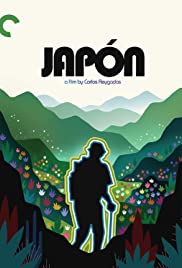
JAPON
Mexico, 2002, 130 minutes, Colour.
Alejandro Ferretis, Magdalena Flores.
Directed by Carlos Reygadas.
Japon is the first film by celebrated Mexican director Carlos Reygadas. It received great acclaim when first released, it being seen in the tradition of the classic film-makers like Tarkovsky and Bresson. Reygadas also received acclaim in Cannes. His second film, Batalla en el Cielo, was also in competition in Cannes, a very confronting film set in Mexico City. He was also in Cannes in 2007 with the internationally-acclaimed film, Silent Light (Stellet Licht), a film about a remote religious community in Mexico and the interactions.
Japon – the title may be a reference to hara-kiri because the central character, a painter from the city, comes to a remote village in order to commit suicide – is something of a meditation, reflection on the meaning of life and death. The painter gets a lift into the village, stays with a seventy-nine-year-old woman whose name is Acens, referring to the ascension of Jesus. In his life in the village, the painter begins to appreciate Nature – although he sees it in its cruelty as well as in its beauty, has a sexual encounter with the woman which is symbolic (as in Batalla en el Cielo) of people coming to life sensually.
Finally, in a seven-minute shot with a circulating camera, Reygadas brings us to the realisation that the man has discovered that there can be some meaning in life and that he should continue living. The film won many awards including the ecumenical prize in Bratislava 2002.
1.The impact of the film? A cinema essay? Cinema poem? The critical acclaim? A film from Mexico? Style, issues?
2.The title, a state of mind, hara-kiri and suicide?
3.The quality of the camerawork, the special flair, especially at the end?
4.The musical score, the classics, the use of Avo Part? The songs?
5.Mexico, the countryside, the road, the mountains, the village and its isolation? Poverty?
6.The man, in himself, his age, the background of his being a painter, his walking-stick, the nature of his journey? Suicide and his motivations? The canyon, the hunters and the guns? The lift? The advice of where to live? Acen and her welcome? Drinking with the men, the nephew and his plot? Life in the village?
7.The transformation of the man, the role of children, the pigs and their scream of death, the horses and their mating, the bird and the decapitation?
8.Acen, her age, dignity, the wise woman? The sensual encounter and its realism or symbolism?
9.The final shot? The nature of the man’s journey, rediscovering Nature, rediscovering his feelings and sensuality? The various types? The stone, the new journey, Acen and her contribution, the accident, death?
10.An existential portrait of human nature.